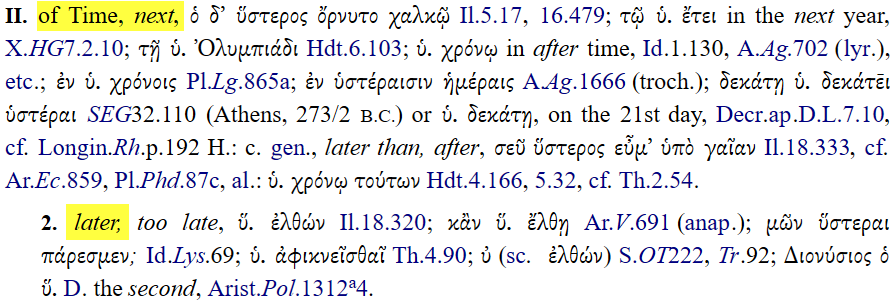The Dative τοῖς ἀρχαίοις
The dative τοῖς ἀρχαίοις need not be understood in English as “by those of old time” (instrumental dative); it could also be understood as “to those of old time”1 (dative of indirect object). If the latter, note the consequent parallelism:
21 You have heard that it was said to those of old time, “You shall not murder, and whoever shall murder shall be liable to the tribunal,”
22 But I say to you, that whoever is angry with his brother without a cause shall be liable to the tribunal, and whoever shall say to his brother, “Raca,” shall be liable to the Sanhedrin, and whoever shall say, “You fool!,” shall liable to the fiery Gehenna.
The Meaning of ἀρχαῖος
ἀρχαῖος need not refer to an ancient or distant time in the past (i.e., antiquity). It can simply refer to any time earlier than the present, as opposed to ὕστερος, which would refer to any time later than the present.
According to LSJ,2 ἀρχαῖος can be used as the opposite of ὕστερος.

Regarding ὕστερος, LSJ states that, with respect to time, it can mean next or later (i.e., what follows the present time).3

On a timeline, it would appear as follows:

Therefore, τοῖς ἀρχαίοις (nom. οἱ ἀρχαῖοι) can be understood as “the earlier people” (or the earlier generations), as in, all those who preceded the Lord Jesus Christ. We need only ask ourselves, who were the people who heard it said to them, “You shall not murder...”? The answer is: more or less every Jewish person since Moses (and before Jesus) had heard that said to them, whether from their own fathers, or by hearing it in the synagogue on the Sabbath.4
Interpretation
By contrasting what was said to all earlier generations versus what he was saying to his audience now, the Lord Jesus Christ was establishing his authority over everyone who preceded him, including the scribes and Pharisees.5 In Matthew 7,
28 And it came to pass, when Jesus had ended these sayings, the people were astonished at his doctrine. 29 For he was teaching as having authority, and not as the scribes.
The scribes and the Pharisees sat on Moses’ seat.6 Yet, the Lord Jesus Christ is greater than Moses.7 Therefore, he had greater authority than all those who preceded him.
Footnotes
1 cf. Rom. 9:12 (ἐρρήθη αὐτῇ—“it was said to her”), 9:26 (ἐρρήθη αὐτοῖς—“it was said to them”); Rev. 6:11 (ἐρρέθη αὐτοῖς—“it was said to them”), 9:4 (ἐρρέθη αὐταῖς—“it was said to them”)
2 LSJ, p. 251
3 id., p, 1906
4 Acts 15:21
5 cf. Matt. 7:28–29
6 Matt. 23:2
7 Heb. 3:3
References
Liddell, Henry George; Scott, Robert; et al. A Greek-English Lexicon. 9th ed. with revised supplement. Oxford: Clarendon, 1996.


